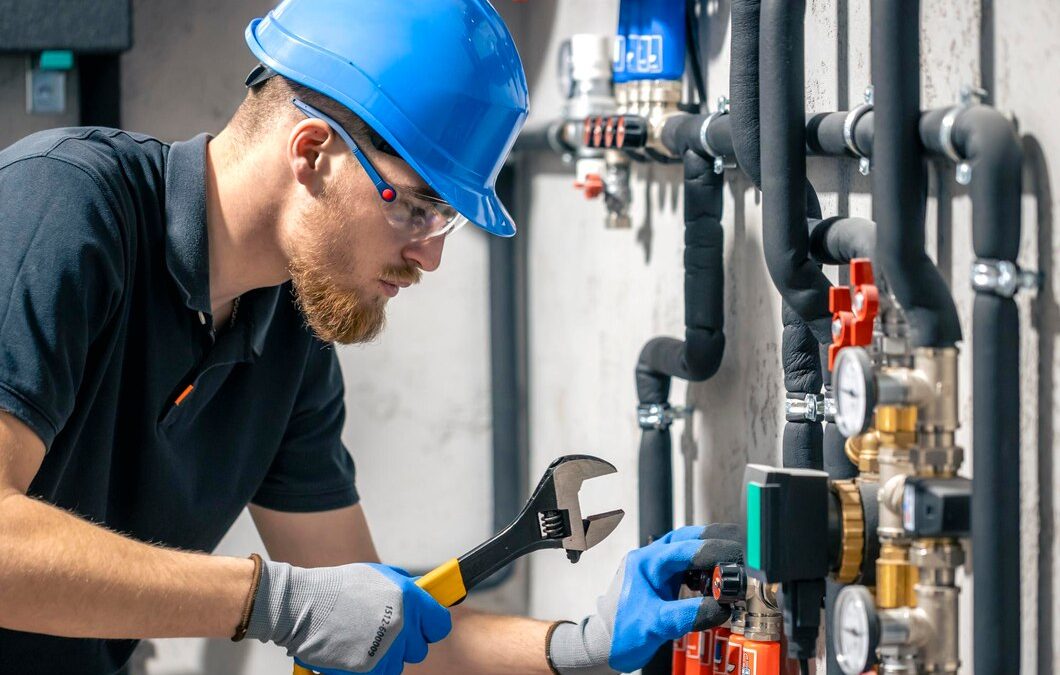Plumbing emergencies in commercial properties can cause a lot of trouble and disrupt your business operations. Whether it’s a burst pipe or a clogged drain, these issues need immediate attention. An unresolved plumbing problem can lead to water damage, which might be costly and time-consuming to fix. Therefore, being prepared and knowing what to do during these emergencies is crucial.
In this guide, we will discuss common plumbing emergencies that businesses might face and provide essential tips to handle them. Catching these problems early can save you a lot of hassle. We’ll also cover the basic tools every business should have on hand to manage minor issues before professional help arrives. Finally, we will help you understand how to choose the right emergency plumbing service for your business needs. This knowledge ensures you’re never caught off guard, keeping your premises safe and operational.
Understanding Common Plumbing Emergencies in Commercial Properties
Commercial properties can experience various plumbing emergencies that disrupt daily operations. One common issue is burst pipes, which can occur due to freezing temperatures, high water pressure, or old, corroded pipes. When a pipe bursts, it can cause significant water damage to the property and even create structural problems if not addressed quickly. It’s important to be aware of the signs of a burst pipe, such as unexpected puddles on the floor, low water pressure, or damp walls.
Another frequent issue in commercial properties is clogged drains and toilets. Employees and customers often flush items that should not go down the drain, causing blockages. This can lead to overflowing toilets, unpleasant odors, and backups that can halt your business operations. Regular maintenance and educating employees about what not to flush can help minimize these occurrences. Also, having a proper waste disposal system in place is crucial to avoid these problems.
Steps to Take When You Face a Plumbing Emergency
Facing a plumbing emergency in a commercial setting requires quick thinking and immediate action. First, locate and turn off the main water supply to prevent further water damage. Knowing where your water shutoff valve is located before an emergency happens can save valuable time. Once the water is shut off, turn off any electrical appliances near the affected area to prevent electrical hazards.
Next, assess the situation and determine the severity of the problem. You might be able to handle minor issues like a small leak or a clogged toilet with basic tools and supplies on hand. However, for more serious problems, such as a burst pipe or major flooding, it’s important to call a professional plumber right away. While waiting for help to arrive, try to contain the water using buckets, towels, or a wet/dry vacuum. Communicate clearly with your employees and customers about the situation to ensure their safety and minimize panic.
Understanding Common Plumbing Emergencies in Commercial Properties
Plumbing emergencies can disrupt the daily operations of a commercial property, leading to costly downtime and repairs. One common emergency is a burst pipe, which can cause significant water damage and may require immediate attention to prevent further issues. Burst pipes are often the result of freezing conditions, old or corroded pipes, or excessive water pressure.
Another frequent problem is sewer system backups. These occur when the sewer lines become blocked, causing wastewater to flow back into the building. This can lead to unsanitary conditions and damage to property. Major causes of sewer backups include clogging from non-flushable items, tree root intrusion, and broken sewer lines. Understanding these emergencies can help you act swiftly to mitigate damage.
Steps to Take When You Face a Plumbing Emergency
When a plumbing emergency occurs, quick action can minimize damage. First, turn off the main water supply to stop water flow. This is crucial in cases like burst pipes or major leaks. Knowing the location of your shutoff valve and how to operate it can make a big difference in an emergency.
Next, assess the situation and contact a professional plumber immediately. Describing the problem accurately can help them prepare and respond more effectively. While waiting for help, try to contain the water using buckets, towels, or a wet vac. If the problem involves a sewer backup, avoid using water until the issue is resolved to prevent further contamination.
Essential Emergency Plumbing Tools Every Business Should Have
Having essential plumbing tools on hand can help you manage minor emergencies before professional help arrives. A plunger is useful for clearing clogs in toilets and drains. It creates suction to dislodge the blockage. Keep both a sink plunger and a toilet plunger, as they are designed differently for maximum efficiency.
Another useful tool is a wrench set, especially an adjustable wrench. This can help tighten or loosen fittings and pipes. A plumber’s tape (Teflon tape) is also handy for sealing leaks in pipe joints. Lastly, a wet/dry vacuum can be invaluable for quickly removing standing water in case of leaks or minor floods. Having these tools can help you manage minor problems and prevent them from escalating.
Selecting the Right Emergency Plumbing Service for Your Business
Choosing the right emergency plumbing service is crucial for effectively handling any crises. Start by looking for a company with a proven track record in commercial plumbing. Reviews and testimonials can offer insights into their reliability and expertise. It’s also beneficial to choose a service that offers 24/7 availability, ensuring help is always a call away.
Another key factor is whether the service is licensed and insured. This provides peace of mind that you’re working with professionals who meet industry standards. Additionally, ask if they offer guarantees or warranties on their work. Clear communication and transparent pricing are also important. You want to avoid surprises when it comes to the cost and extent of repairs. Selecting the right service can save you time, money, and stress during an emergency.
Conclusion
Water pressure issues in commercial buildings can have significant impacts on daily operations and long-term costs. Understanding the causes and signs of these issues allows for timely interventions and effective solutions. Regular maintenance checks and proactive management of water pressure are essential for preventing major disruptions.
Having the right tools and knowing emergency steps are integral in managing small crises effectively. Most importantly, choosing a reliable emergency plumbing service ensures that professional help is available when you need it most. Regular inspections and attention to plumbing details can maintain optimal water pressure and avoid costly emergencies.
If you’re experiencing water pressure issues or need expert commercial plumbing solutions, contact Plumb Krazy Plumbing. Our team of commercial plumbing contractors is ready to provide top-notch service, ensuring your building’s plumbing system remains in excellent condition.

